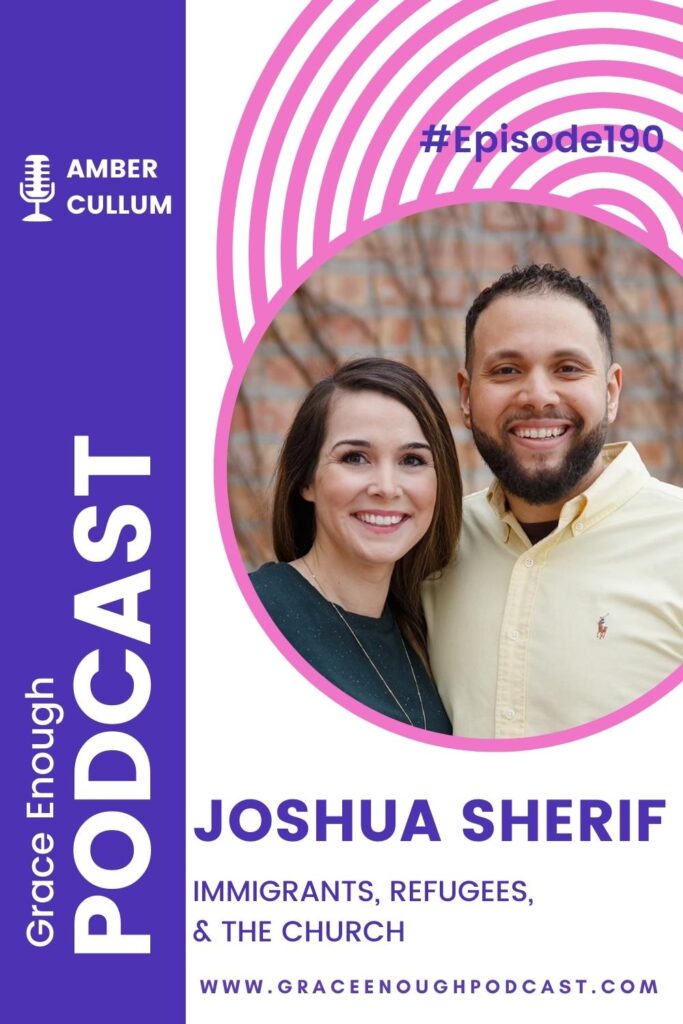
JOSHUA SHERIF was born in Egypt to a Muslim family and immigrated to the United States, where he later came to faith in Jesus.
Before transitioning to a new role, he planted and pastored in Albany Park, Chicago, IL, one of the most diverse neighborhoods in the country for a decade.
Joshua has enjoyed his years equipping and coaching other missionaries and pastors around the world.
In his new role, Joshua now works bi-vocationally to equip churches to reach their cities.
His story was featured in Love Costs Everything, a documentary produced by CIY and Voice of the Martyrs, concerning Christian persecution.
Joshua Sherif and Amber discuss his life as a Muslim boy in Egypt, his immigration to the United States, coming to faith in Jesus, and casting a wider net for discipleship in our communities. Josh shares his experience as a US immigrant and as a pastor of a church representing more than 30 nationalities, and speaking 20 languages in his new book, The Stranger At Our Shore: How Immigrants and Refugees Strengthen the Church.
“I was probably the one dragging my father to the mosque. And I had this ambition to please God by being an imam.”
“At a young age, my mother had an encounter with Jesus as well, and had been living as a secret Christian for a long time.”
“I look over and my mother had taken off her head covering, her hijab….I told my mother, ‘You’re, gonna go to hell.’ And I did not understand what she was saying then, but it stuck with me because it was scary to hear. She said, ‘I just got out’.”
“My mother came to Christ. And then I came to Christ, and then my sister came to Christ. And real quickly, it turned dangerous for my mother….We spent 10 years living on the run, anonymous names, going across the country, P.O. boxes, all kinds of crazy stuff.”
“[The] theme of fear, permeated a lot of my childhood…but it was also a time of God’s grace.”
“I would say that parable of finding a treasure in the field is important to me….We’d found this Good News of Jesus, this treasure in the field, and…we’re willing….to give up everything to go buy that field and gain that treasure.”
“What I discovered in Scripture was a God who would was completely different in character than anything I’d been presented.”
“What I saw in Jesus is a father, a Savior, and a God who is love. And those characteristics are unmatched and unfounded. Specifically, for me in my context of the God of Islam that I had been pursuing….I found a God who was more passionate, and in more pursuit of me than I could ever be of him. And so, for me, it just was a truth revealed that I couldn’t deny.”
“The big theme that I tie through this book is fear. And what I’m able to do is give the lens both ways, because walking in to the shores of America or any other country as an immigrant or refugee, there’s fear there….And that fear is not one sided. That fear is often met with fear from the from the other side.”
“I also spend time talking about the three heart issues… inadequacy, ignorance and indignation.”
“I think sometimes we can filter out the credit that goes to Jesus by our own false sense of competence.”
“I don’t call people to be self deprecating, but but I think there is a reason why Paul says I boast in my weakness because God’s glory in His strength flows there.”
“You don’t know their language, they don’t know your language. [They don’t] know your customs, you don’t know their customs. There is, in a sense, nothing left unsaid, everything has to be talked about. And there is so much grace, because they don’t expect you to to get all their customs.”
“A lot of times, when we have a heart change, we look at the people who haven’t quite yet had a heart change, or don’t quite see things that we see… and instead of, I used to have indignation towards Muslim people or immigrants or refugees, now I have indignation towards my Christian brothers and sisters who just don’t get it…What Jesus is calling us too is not to just shift our indignation, but to actually remove our indignation.”
“It’s not that we’re gracious people from a wealthy country welcoming the least of these,..but it’s realizing that we are all foreigners, and strangers in the sight of God. Scripture says, we were once enemies of God and it’s at that point that Christ died for us and that brought us into His family. And so once we realize that their story is our story in the family of God, how can we not be moved to help?”



© Grace Enough Podcast2024